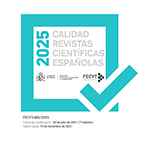Cooperation and Social Response to the COVID-19 Pandemic: The Case of the Neighborhoods of Valencia, Spain
Abstract
Solidarity initiatives to respond to the crisis derived from the COVID-19 pandemic, although
widespread, showed a marked spatial bias. This article analyzes, through a combination of qualitative
and quantitative techniques, the territorial and social factors that conditioned the response to the crisis
by neighborhood associations in seven neighborhoods of the city of Valencia. The results show the
importance of the relational capital generated in previous stages, as well as the characteristics of the
network (diversity and functions of the nodes) that acted as a necessary support infrastructure for the
articulation of collective initiatives in neighborhoods with older people. socioeconomic needs.
Likewise, the impact that the transformation of the social fabric that occurs in neighborhoods affected
by processes of gentrification and population substitution can have on these networks is verified through
the case study.
Downloads
Article download
License
In order to support the global exchange of knowledge, the journal Geopolítica (s) Revista de estudios sobre espacio y poder is allowing unrestricted access to its content as from its publication in this electronic edition, and as such it is an open-access journal. The originals published in this journal are the property of the Complutense University of Madrid and any reproduction thereof in full or in part must cite the source. All content is distributed under a Creative Commons Attribution 4.0 use and distribution licence (CC BY 4.0). This circumstance must be expressly stated in these terms where necessary. You can view the summary and the complete legal text of the licence.









